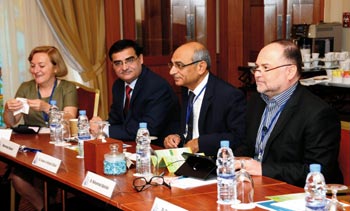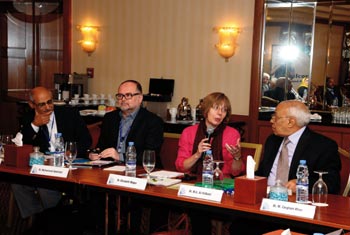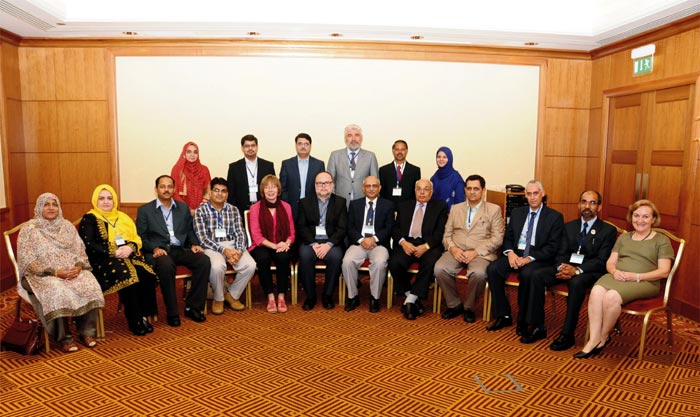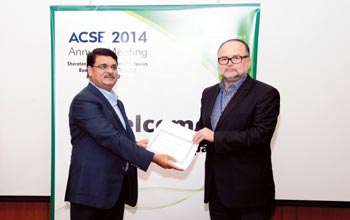| |
ACSE 2014 Annual Meeting
Open Access Scholarly Publishing in Asia: Changes and Challenges
August 14-15, 2014,
Dubai, UAE |
| |
The Asian Council of Science Editors held its first Annual Meeting in Dubai on 14-15 August 2014. More than twenty participants from different countries including India, UK, Iran, Turkey, Egypt, Dubai and Pakistan attended the meeting and gave valuable presentations on Open Access Scholarly Publishing in Asia: Changes and Challenges. After the presentations, an open discussion forum was conducted on the second day of the event in which participants shared their views about their understandings from presentations and also gave remarkable suggestions to develop a strong modus operandi for ACSE. |
 |
One of the key elements of this meeting was to provide a networking platform to participants to share their ideas regarding scientific publications At the conclusion of the meeting, ACSE organized a city tour of Dubai for the Participants.
The first session of the meeting began at 8:30 am on 14th August in Deira Conference Room of Sheraton Creek Dubai.
Dr. Majid Moridani from Medical College of Wisconsin, USA, the President of the ACSE joined the meeting through video conference and began the session formally by welcoming participants. After having their brief introduction, Dr. Moridani shared the objectives and functions of the ACSE with the participants.
Dr. Moridani then gave a presentation entitled "Authors, Reviewers, Editors, Publishers, and Subscribers: Roles and Responsibilities." He highlighted the roles and responsibilities of all stakeholders in scientific publishing including authors, editors, publishers, reviewers and subscribers in a very comprehensive manner. He also emphasized on a need for development of an indexing database similar to PubMed for publications in Asia. This is the key for development and survival of scientific publishing and open access journals. PubMed refusal to index a journal can be remedied with such indexing services. He then requested Dr. Mohammad Abdollahi to Chair and conduct the rest of the session. A chain of presentations begin after this.
Mr. Mohammad Shakeel from Science Publications, Australia gave a detailed presentation on Standard Operating Procedure for Scholarly Journals. He proposed a complete standard operating procedure and also shared a case study of Science Publications in which the proposed model was success-fully implemented. He also suggested that ACSE should devise a committee which should establish a proper standard operating procedure and focus its key stakeholders to follow the SOP.
Dr. Hulya Atil from Ege University, Turkey, briefed the participants about current scenario of open access scholarly publishing in Turkey and future strategy. She gave an overview of the development of open access in Turkey and provided a detailed briefing about the open access publishing models in Turkey along with some key statistics. In her suggestions, she shared the Science Society Strategy Plan which is aimed to bring together the academic outputs of universities in Turkey rapidly and regularly and also shared different measures that can be taken in Turkey regarding the open access publishing.
Dr. Mohammad Abdollahi from Tehran University of Medical Sciences, Iran, gave a presentation on Publishing Ethics and shared the guidelines proposed by COPE in this regard. He shared with the participants how to deal with the misconduct in publishing and how COPE can be of a great resource in dealing with it. He shared the guidance documents for editors, publishers, board of directors and peer reviewers and flowcharts that can be helpful in dealing with misconduct. He went over the details of most common forms of misconducts through case studies.
|
The tea break was announced at 10:45. During the tea break, participants interacted and continued their discussions. After the tea break, Dr. Elizabeth Wager from Sideview, UK gave a very interesting presentation on Correcting the Literature: Retractions, Corrections and Expressions of Concern. She shared her thoughts regarding the need of guidelines for retractions. While discussing about the correction of literature she shared the COPE guidelines indicating that, "The main purpose of retractions is to correct the literature and ensure its integrity rather than to punish authors who misbehave". By providing a few interactive case studies, she discussed further how important is to do retractions and make corrections of literature for misconduct and deal with the honest errors.
|
 |
Professor Mohammad El Wakil from Mansoura University, Egypt shared his views with the participants about the Impact Factor and if impact factor foster the quality of the journal. In this regard, he provided an overview of Impact Factor, how it is calculated and its overall objectives. He focused on the inappropriate uses of impact factor. He then focused on the DORA recommendations for institutions, publishers, researchers, decision makers, funding agencies and the organizations that supply metrics.
Before Lunch, Dr. Ghazala Hafeez Rizwani from University of Karachi, Pakistan gave a detailed presentation on Ethical Behavior in Current Publishing Scenario. In her presentation, she focused how plagiarism can be checked and monitored. Professor Chakka Gopinath from India shared his views on "Do open access scholarly journals have greater citation impact."He discussed the citation impact of different open access journals and gave many examples in this regard.
After lunch break Miss. Nida Mohsin, Event and Membership Coordinator at The ACSE discussed a rising threat to the stakeholders of open access publishing by giving her presentation on Fake Websites Scams in Open Access Publishing. She shared multiple case studies in this regard and also discussed the counter measures which publishers, institutions and authors should do in this regard.
Dr. Kewal Krishan from Panjab University, India discussed about the Open access Journal regimes and state- and presented a country analysis of India in this regard. He discussed different sources of open access in India. He shared the associated problems of open access in India while describing the amenities and infrastructure for OAP in India. Dr. Tanuj Kanchan Kasturba Medical College, India delivered an interesting presentation on "Do open access scholarly journals curb `academic crimes? A special reference to salami practice and plagiarism." After discussing various types of plagiarism and detailed view point about Salami Publications, he shared different strategies to avoid plagiarism. Dr. Natrajen, President, Indian Society for Education and Environment, then shared his views about the Challenges and Strategies in Open Access Journals.
Dr. Aboulata from Egypt gave his opinions and views on Open Access of Scholarly Publications in Asia: Advanced Technology-Associated Domains for Asian Environment. He shared brief guidelines for publishing in OA for editors.

At the end of the session, Dr. Majid Moridani, from US, joined the session through video conference. Dr. Abdollahi and Dr. Liz briefed him about the major points discussed in the presentations. Dr. Majid appreciated the participants for their presentations and recommendations.
After that Certificate Distribution Ceremony was initiated in which Dr. Elizabeth and Dr. Mohammad Abdollahi distributed the certificates among the presenters. The session was then concluded at 5:30 pm by Dr. Mohammad Abdollahi. The participants were offered an honorary dinner by the ACSE at 8:00 pm at a known continental restaurant in Dubai and were taken to have a sight of the dancing fountains near Burj Khalifa after the dinner. The participants expressed their views about the session and interacted with each other on the way back to the Hotel.
|
On the 15th of August, after breakfast, all participants gathered in the meeting room of Sheraton to have a group discussion. Dr. Elizabeth Wager initiated the session and opened the house for discussions. The participants were first asked about the outcomes of the presentations and what they learnt from the presentations. Each participant gave his/her key suggestions concerning the objectives and the next modus operandi of ACSE.
Some key suggestions are: |
 |
- Establishment of regional focus groups in different countries of Asia.
- Organizing different training courses for authors, publishers, reviewers and early career researchers about various aspects of publishing including publication ethics and strong communication skills.
- Monthly Webinars arranged from the platform of the ACSE
- Nominal membership fee for developing countries
- Provision of maximum technical support by ACSE to regional focus groups
- Stronger collaboration with already established organizations working for Publication ethics and the betterment of the stakeholders of scientific publications.
- A regular annual meeting of the members in Head Office of ACSE, Dubai
- Establishment of the constitution of the ACSE with the help of already established organizations.
- Strategic partnership of ACSE with the other organizations working for the editors and publishers.
With these suggestions, all participants showed their enthusiasm and willingness to work with the ACSE in their respective domains. They ex-pressed thanks to ACSE for arranging the meeting and providing them a chance for networking with the key professionals in the world of scientific publications in Asia and elsewhere. After the group discussion, Mr. Mohammad Sarwar, Secretary, The ACSE, expressed his views and thanked all the participants to make the meeting a successful event.
Participants were then taken to the city tour of Dubai where they visited Burj Khalifa and Dubai Mall. During the visit participants exchanged their contacts and had a pleasant time. After that, ACSE arranged a Lebanese Lunch for all the participants at AL Hullab Restaurant which all participants enjoyed.
|
| |
|
| |
 |
 |
 |
 |
 |
 |
 |
 |
 |
 |
 |
 |
 |
 |
 |
 |
 |
 |
 |
|